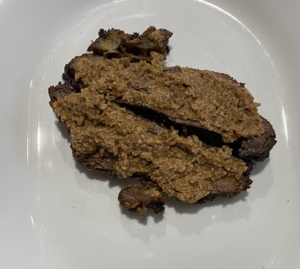How to stay food safe with your charcoal cooker Part 2 Preparation
In the first part of this series discussed how to safely store your meat. Now in Part 2 will look at different ways of preparing the meat for cooking.
At its simplest, meat can be cooked on your charcoal cooker, plain, then served with a sauce, gravy or garnish. Most people find this bland and like to season their meat for extra flavour. An easy way is to just use salt and pepper.

Salt and pepper seasoning
Grind rock salt and peppercorns evenly on one side of your steak, chop, chicken or fish fillet and flip over and repeat. Cover and leave in fridge for at least 1 hour. After the meat has been cooked, eat it plain as the salt and pepper enhances the meat and charcoal flavour. Or serve it with your favourite sauce, gravy or tasty garnish like our Olivada (signature olive marinated olives, depipped and blended to make a delicious olive paste).
Marinades
A marinade can add a lot of flavour to your cooking. Some people think that using a marinade will also tenderise the meat. Using a marinade will not necessarily tenderise the meat as tenderness is attained by using the right cut for the cooking method and then cooking it well.
If you want to make your own marinades, it’s best to start with a simple flavour approach. Use the ingredients you have in your fridge, pantry and herb garden. Be careful with the amount of sugar or salt in your marinade. Marinades too high in sugar can burn before the meat is cooked, while marinades too high in salt can leach out the meat juices. Usually about ½ cup marinade is needed for 500g meat.
There are wet marinades that are usually made of three parts
One: 1 part acid (vinegars)
Two: 3 parts oil or fat
Three: Seasoning (herbs and spices).
Wet marinade recipes
- Mix ½ grated onion and cook with 1 tablespoon of oil and 1 clove of crushed garlic. Add 1 teaspoon of dry mustard, 1 tablespoon of Worcestershire sauce, ¼ cup brown vinegar, 1/3 cup brown sugar, ½ cup tomato paste and ½ cup of water. Simmer for 10 minutes, stirring occasionally.
- 1 teaspoon each of ground cardamom and ground cinnamon, 2 teaspoons each of ground cumin, turmeric and hot mustard, ¼ teaspoon chilli flakes and ¼ cup white vinegar, mix well.
Place meat and marinade in a non-reactive container like stainless steel or glass. Don’t use aluminium containers because the aluminium can react with the acid in the marinade. Cover and place in the refrigerator, turning the meat at least once so it’s all covered in the liquid. A wet marinade can add extra moisture and help leaner cuts of meat. Delicate pieces of meat like fish and chicken need minimal time.
Wet marinade soaking times
Fish: 15-30 minutes (1 hour max)
Chicken: 2 hours
Pork: 4 hours
Lamb: 4-8 hours
Beef: 24 hours or more.
Dry marinades and pastes
Dry marinades or rubs are made from dried spices and dried herbs. The meat absorbs the essential oils from the dried ingredients. Pastes are an addition to dry marinades as they can have dried and fresh herbs with a little oil or ground ginger and garlic to make a paste. The moisture in the paste is just enough to keep the ingredients together.
Dry marinade or rub
- Combine 3 tablespoons brown sugar, 1 ½ tablespoons paprika, 1 ½ tablespoons salt, 1 ½ tablespoons ground black pepper, 1 teaspoon garlic powder.
- Combine 1 teaspoon paprika, 1 ½ teaspoons dried thyme, 1 ½ teaspoons dried basis, ¾ teaspoon cumin, 2 tablespoons curry powder.
Marinade paste
- 2 green chillies, 3 garlic cloves, ½ teaspoon black peppercorns, ½ teaspoon ground cinnamon, ½ teaspoon cardamom, juice of 2 limes and 1 tablespoon olive oil – place in blender and blitz.
- 2 teaspoons turmeric, ½ teaspoon chilli powder, 2 cm fresh ginger, 2 garlic cloves, 3 teaspoons olive oil – place in blender and blitz.
Rub a dry marinade or paste into the meat about 20 minutes before cooking. Press the dry marinade or paste evenly over the meat.
Keep your marinating meat in the fridge unless you’ve made it and are going to cook it straight away.
When you’ve decided the best way to prepare your meat, it’s time to cook. Part 3 coming soon.